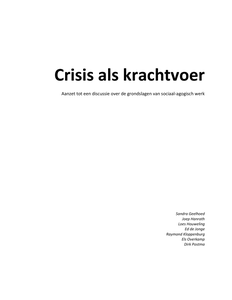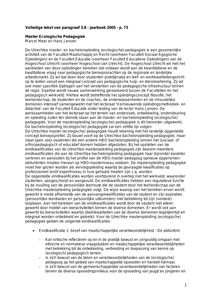Dit domeinplan hsao is ontwikkeld om te vermijden dat investeren in de meerwaarde van digitaal onderwijs zich in gespreide slagorde ontwikkelt en elke hsao-instelling opnieuw het wiel uitvindt. In dit plan wordt de huidige situatie van technologiegebruik in werkveld en opleiding van het sociaal-agogische domein in kaart gebracht, en tevens de te verwachten toekomstige ontwikkelingen. Op basis van deze informatie worden consequenties voor het onderwijs getrokken, alsook een prioriteitstelling naar te ontwikkelen producten en diensten.
DOCUMENT
Dit essay legt het belang van de gelaagdheid in het sociaal werk bloot. Professionals willen weten hoe het werkt, organisaties wat er werkt en bestuurders waartoe het werkt. Omdat hierover tussen de verschillende partijen geen helderheid bestaat, ontstaat een Babylonische spraakverwarring en afrekencultuur. Een essay over de gelaagdheid van kennis in de sociale sector.
DOCUMENT

Bij de aanvang van het lectoraat 'sociale infrastructuur en technologie' was onze doelstelling te komen tot een inventarisatie van ict gebruik in de sociale sector. Daarbij ging het ons om praktijken en initiatieven in de sociale sector waarbij men gebruik maakt van moderne technologie ter versterking van de sociale infrastructuur, de leefbaarheid van samenlevingsverbanden, de participatie in de publieke besluitvorming, de hulp- en dienstverlening aan cliknten en deelnemers. Met de sociale sector worden alle institutionele arrangementen bedoeld die het werken aan welzijn als primaire doelstelling hebben. Het gaat hierbij niet om een zoveelste onderzoek teneinde een volledig, kwantitatief gericht beeld te krijgen. Er werd gestreefd naar een beschrijving van veelbelovende aanpakken, niet alleen binnen de institutionele welzijnszorg, maar ook projecten en activiteiten die op initiatief van burgers buiten de sociale sector-in strikte-zin zijn opgezet.
DOCUMENT

Debates about social theory and social policy are highly fragmented and unclear in subject and direction. A recognised paradigm is failing. Maybe we have to accept that social reality is not to reconstruct in social theory. But we certainly need social theorists and social theories to support citizens, policy makers and social workers in improving social reality. Social reality in post modern societies is to be characterized by problematic relationships among citizens and between citizens and the public sector and by a sharp rise in problematic behaviour. The affluent society has failed to create a more sensitive world where people behave more socially. The dominant social problem is no longer seen from a social economic perspective but from a social cultural one. Social competences and social capital are considerer to be essential assets to cope with life in post modern society. For people weak ties and thin trust are essential to integrate into society. Thick trust and strong ties can bind people to much and cause inflexibility. The current social problem is a matter of designing a social world where relationships and behaviour are fair and reasonable. It asks for an interesting and creative social policy and social work, not too much stressing the problematic issues but encouraging people to trust each other. Current social policy is too much focused on the needs and problems. It has to change into a more expressive social policy, a policy that people challenges to express them and to create new relationships. Social behaviour asks for flexibility and creativity, for being authentic and playing roles. Scientists, policymakers, social workers and citizens are in the same field and have access to the same knowledge.
DOCUMENT

Evidence based practice, wie kan daar tegen zijn? Toch blijkt evidence based werken in de sociale sector nog niet zo eenvoudig uit te voeren. Mensen op de werkvloer stellen dat weinig methoden werkelijk aantoonbaar effectief zijn, en onderzoekers morren dat er te weinig gebruik wordt gemaakt van hun wetenschappelijke kennis. Ondertussen staat de kwaliteit van de sociale sector steeds opnieuw ter discussie. Dit boek beschrijft de inhoud en relevantie van evidence based practice, maar ook de bijziendheid van die benadering. Er zijn immers behalve wetenschap nog veel meer krachten die de dynamiek op de werkvloer van de sociale sector beïnvloeden. De basis waarop professionals kiezen een bepaalde sociale interventie wel of niet te gebruiken omvat veel meer dan alleen wetenschap. Aan de hand van theoretische beschouwingen en biografieën van sociale interventies verruimen de auteurs de discussie over beroepsinnovatie. Hoe goed is de sociale sector in staat om lessen te trekken uit zijn eigen geschiedenis? Brengt de canon sociaal werk alleen maar voortgang in beeld of ook vooruitgang? En is het mogelijk de kwaliteit van de sector daadwerkelijk te verbeteren door inzichten uit praktijk en wetenschap te gebruiken? Bestemd voor iedereen die bij de sociale sector betrokken is en een eigen mening wil vormen over de discussie over evidence based practice: hulpverleners, managers van welzijnsinstellingen, ambtenaren sociaal beleid bij gemeenten, studenten hoger sociaal agogisch onderwijs en uiteindelijk ook de cliënten die van al deze mensen hulpverlening krijgen.
DOCUMENT

Deze meetladder biedt vragen om onderwijs te onderzoeken en verbeteren op diversiteitsgevoeligheid. Wat moeten studenten leren om als professionals om te kunnen gaan met een diverse cliëntenpopulatie, te werken in divers samengestelde teams en hoe moet dat leerproces eruit zien? Welke eisen stelt professionele ondersteuning en begeleiding van gezinnen in een multi-etnische context aan het curriculum van pedagogische en sociaal-agogische opleidingen? Welke communicatieve en didactische vaardigheden zijn nodig? Zelfonderzoek in het onderwijs biedt aandachtspunten om met elkaar tot veranderingen te komen.
LINK
Het zoeken naar gemeenschappelijke grondslagen is een hachelijke onderneming. Paradoxaal genoeg verkeert een zoektocht naar ‘wat ons bindt’ vaak in haar tegendeel; het slaan van piketpaaltjes, het markeren van grenzen, van wat ons verdeelt. Met onze aanzet tot een discussie over de grondslagen van social work richten we ons nadrukkelijk niet op de indeling van werkvelden, beroepsprofielen en opleidingsprofielen en onderwijsstructuren, maar op de vraag die daar aan voorafgaat: de vraag naar wat ons in het professionele handelen gezamenlijk uitdaagt. Antwoorden op die vraag zoeken we in de maatschappelijke transities waaraan we momenteel gezamenlijk onderworpen zijn, en waarin het lot van sociaal-agogische beroepsgroepen in sterke mate met elkaar verbonden zijn. Daarbij richten we onze blik van buiten naar binnen: welke ontwikkelingen doen zich op dit moment in de samenleving voor en wat betekenen deze ontwikkelingen voor de sociale professionals die we opleiden?
DOCUMENT

De Utrechtse master- en bacheloropleiding (ecologische) pedagogiek is een gezamenlijke activiteit van de Faculteit Maatschappij en Recht (voorheen Faculteit Sociaal Agogische Opleidingen) en de Faculteit Educatie (voorheen Faculteit Educatieve Opleidingen) van de Hogeschool Utrecht (voorheen Hogeschool van Utrecht). De Hogeschool Utrecht wil met het aanbieden van deze opleidingen bereiken dat voldaan wordt aan de kwantitatieve en de kwalitatieve vraag naar pedagogische beroepskrachten op de regionale en landelijke arbeidsmarkt. Zij wil dat doen door studenten praktijknabij en leef- en werkkwaliteitengericht op te leiden vanuit een integraal concept van pedagogische hulp- en dienstverlening. Zij wil ook meer specifiek bijdragen aan het versterken van de pedagogische infrastructuur binnen de regio. Daartoe wordt nauwe samenwerking gerealiseerd tussen de Faculteiten en het pedagogisch werkveld. Hiertoe wordt betreffende het opleidingsconcept filosofie, het leerlandschap, de studenten en de coaches, de onderwijseenheden en de inhoudelijke domeinen intensief samengewerkt met het lectoraat Vernieuwende opleidingsmethodiek- en didactiek van de Faculteit Educatie onder leiding van de lector Hans Jansen.
DOCUMENT

As labour is becoming more and more knowledge controlled, it also getting closer to the individual person. We sometimes seem to forget this. To an increasing extent it is becoming a part of oneself and therefore of the personal identity. The increasing humanization of labour asks for an HRM-policy and an organizational context in which the individual is able to identify with the organization, colleagues, customers/clients and product. Heterononimous or abstract organizations, organizations in which the employees and civilians have been reduced to numbers and in which there is no real consideration for the individual differences, have to make way for organizational structures in which the individual feels (self) responsible again. The future lies with personal, tribally inspired organizations in which managers will be leaders and where employees and managers can show social commitment. Images like that of: the egocentric boss who by making swift career moves avoids responsibility for employee/co-worker and customer/client; of colleagues taking the day off without consultation or who are putting their phone through to someone else without saying so beforehand, meeting rooms which are not being cleaned up after use and the image of a Xerox machine not being refilled up with paper by anyone, are all too frequently dismissed as not being part of productivity.
DOCUMENT
